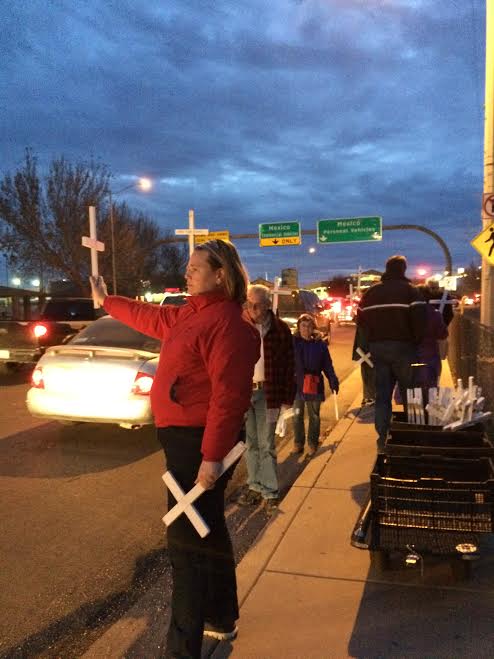Healing Our Borders
I recently stood in a prayer circle of about thirty interfaith activists, a few steps from the border checkpoint. Every Tuesday evening, local activists and visitors to the border gather for a "Healing Our Borders" Vigil to pray and remember those who have died making the journey north. We processed down the street towards the border checkpoint, calling out the names of some of the estimated 6,000 migrants who have died along the nearly 2000-mile U.S./Mexico border.
We held up white crosses and named them present – presente – proclaiming their lives as dignified and their deaths as worthy of commemoration.
Back home, I knew my Sinsinawa Dominican Sisters – along with all those who follow the monastic rhythm of liturgical prayer – were gathered for vespers, which closes with a supplication for "a restful night and a peaceful death." My heart carried lament for deaths from hyperthermia and dehydration under the relentless desert sun, deaths not marked by the comfort of anointing oil, words of final blessing, or the ease of a deathbed attended by loved ones.
A key question arose for me:
How are we to recognize and resist unconscious biases and the "othering" of the other in order to cultivate human solidarity?
Harvard psychologist Dr. Mahzarin Banaji, author of Blind Spot: the Hidden Biases of Good People, claims that the human mind is a "difference-seeking machine." Her research shows we unconsciously label others as either like us or not, based on race, gender, and other features – even if consciously we would disapprove of these biases. Banaji recommends cultivating relationships with those who are different to expand the circle of holy belonging.
One week after the Healing Our Borders vigil in Douglas, I attended Sunday Mass at Our Lady of Guadalupe monastery in Phoenix, Arizona as part of a Giving Voice gathering of Catholic Sisters in our 20s and 30s.
We sang the song "One Bread, One Body" – one familiar to me and many Catholics – as the communion hymn. Given my recent time on the border and our current political reality, I heard the familiar lyrics differently as I sang the soprano descant and processed forward to receive the Eucharist.
The words "and we though many/throughout the earth/we are one Body in this one Lord" resonate with Banaji's challenge for us to "break bread together" and overcome implicit biases in doing so. The hymn – and the act of sharing Eucharist itself – contradict the many forces in our nation and world which dehumanize those who are different.
After the Healing Our Borders Vigil, a local leader invited us to speak our own names into the circle. Those gathered called back presente as a way of witnessing and affirming each individual's commitment to working for justice, expanding the circle of belonging, saying yes to solidarity and no to dehumanization, recognizing all as "made in God's image and likeness, and beloved by God."
Rhonda Miska is a candidate with the Sinsinawa Dominican Sisters who is currently co-authoring a book on Dominican holy women. She holds an MA from the Boston College School of Theology and Ministry and serves with Catholic Charities of the Archdiocese of Dubuque Immigrant and Refugee Services. Read more of her writing at: www.clippings.me/rhondamiska
A longer version of this reflection appeared in the Catholic group blog Vox Novaearlier this month. To access this version, click here.


